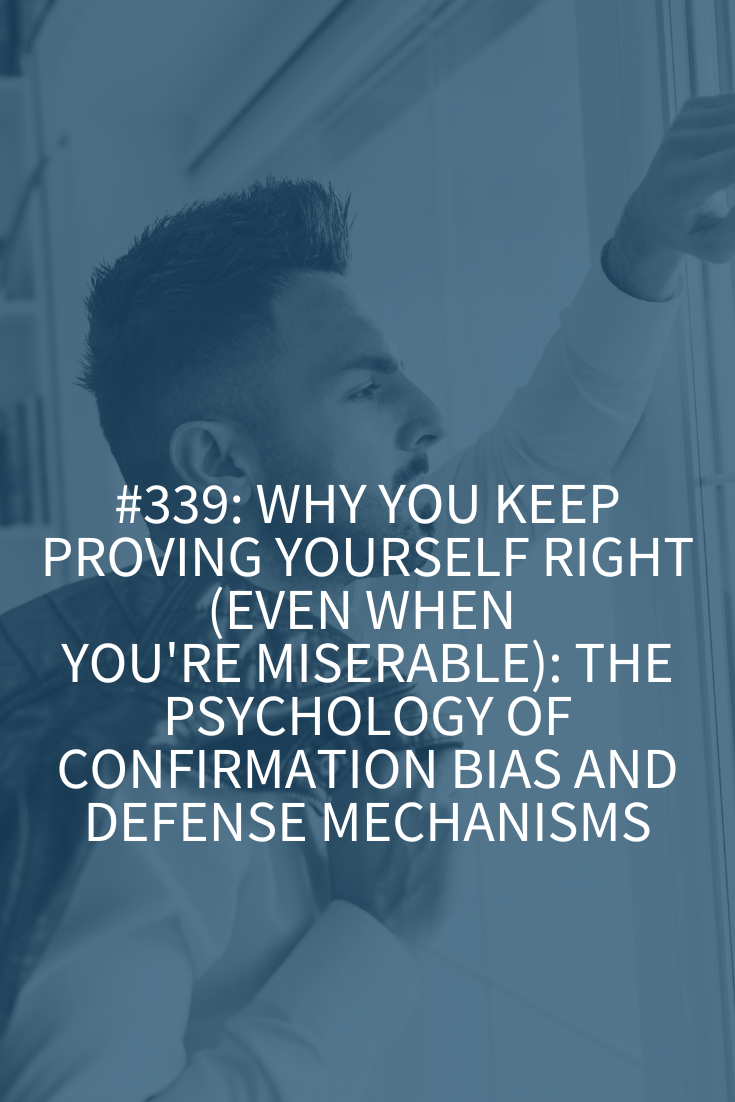
If I had to write down the number one complaint I hear from my clients it would be:
“But I just can’t stop thinking about it.”
Clients come in all the time saying that they just can’t stop playing a certain scenario over and over again in their mind or they just can’t stop worrying about something they think might happen.
Not only are these negative thoughts linked to your mental health (things like increased anxiety and depression), but they’re also hurting you physically! There’s an ever-growing body of research linking negative thoughts and emotions to heart disease, strokes and even dementia!
With all these negative effects, isn’t it time to get really serious about getting rid of them? You can help how you think, and you can change it, but it’s going to take some focused attention.
The four main reasons you get stuck in negative thoughts
#1: Monkey Mind
Monkey mind is what the Buddhists call the phenomenon of allowing your mind to run all over the place, swinging from branch to branch, with no direction. It’s all the internal chatter that you’re often not aware is happening.
When you don’t check these wandering thoughts, they “naturally” lean towards the negative because of your brain’s negativity bias. Allowing your thoughts to focus on worry about the future, regrets, criticisms and judgments is an indulgence you can’t afford to continue.
#2: Momentum
If you had a car on top of a big hill and the brakes went out and it started to roll down that hill, where would you want to stop it? Would you want to stop it at the top of the hill, or would you want to stop it at the bottom of the hill?
It’s not a trick question. You, of course, know that if you waited at the bottom of that hill to try to stop the car you’d fail miserably and get flattened in the process. You’d want to stop the car as close to the top of the hill as possible.
But why is there a difference? It’s the same car and weighs the same at the top of the hill as it does at the bottom. You want to stop it at the top because it hasn’t had a chance to gain any momentum. It’s the momentum and the force that the momentum builds that crushes you under the tires.
And this is the same for your thoughts. Allowing negative thoughts to gain momentum all day is the problem. The secret is to stop those negative thoughts as soon as they happen. You can’t allow them to gain momentum or they’re almost impossible to stop!
#3: It’s a Bad Habit
Negative thoughts can also just become a habit. You’re in the habit of allowing your mind to wander in the shower. You’re in the habit of driving and daydreaming. You’re not in the habit of being mindful in your moments and checking in with yourself.
These habits become a self-fulfilling prophecy. We allow these old tapes to play on a loop and, even though they don’t necessarily have grounding in current reality, we believe them because they’ve been there for so long, so we take them as fact.
“I can’t find a good man.” “I’m no good at math.” Then, our reticular activating system (RAS) takes over and brings us evidence of these thoughts over and over. The RAS is also filtering out anything that doesn’t match these thoughts. So, when a good man does come along, you don’t see him!
RELATED: To learn more about the RAS, click here.
#4: You Want to Be Right
Yup. You’ll often sacrifice your happiness to be right. You get in that argument with your partner and you think, “But, I’m right!” So you don’t back down and you end up playing the argument over and over again in your head and becoming more and more negative about whatever happened.
I call this Correct or Effective: You feel driven to be right about something instead of focusing on being effective. This pushes negative thoughts and feelings to the forefront as you prove your point and work to prove your partner wrong.
The Three Ways of Coping with Negative Feelings That Don’t Work
There are three main ways that people tend to deal with their negative thoughts and feelings that don’t work.
- Emotional Snuggies: Sometimes you might wrap yourself up in what I call an Emotional Snuggie. You’re so focused on being right or you’re focused on not being disappointed, so you wrap yourself up in your cynical and negative feelings and it starts to feel way too comfortable. You dig in and get entrenched in these thoughts and feelings, and so don’t allow in any other way of thinking. This is a huge defense mechanism and it’s hurting you.
- Ignore them: Bottling up or stuffing your negative feelings also doesn’t work because other people can see that you’re upset even though you’re not admitting it and this upsets or stresses them.
The other problem with trying to ignore your negative thoughts is that you’re likely taking out these negative emotions in the wrong place. We call this “displaced emotion”—you’re mad at your boss and come home and yell at your kid.
Also, we know that the more you try to ignore something, the harder it is to get out of your mind (like if I told you right now not to think about a black cat).
- Ruminating: The opposite of stuffing your feelings is to think about them nonstop. If you’re a ruminator, you rehash situations, behaviors and feelings over and over and over again which gets you deeper and deeper into negative thoughts and emotions.
You likely start to blame yourself, “I’m such an idiot!” “Why do I always X?” “How come I can never Y?” You compare yourself to others or some perfect ideal that can never be reached and end up feeling more depressed or anxious.
Instead of participating in these three coping skills that don’t work, you want to focus on these three skills that do work: You want to incorporate tools that help you accept, observe and detach.
With that in mind, here are my top 7 tips to stop negative thinking.
Tips to Stop Negative Thinking
Tip #1: Have a Mantra
A mantra is just your go-to phrase or word to help you stop the momentum of that car on the hill. You want to notice that negative thought and come back to a better feeling, thought, or phrase as soon as possible.
Some common mantras that work in most situations are things like, “This too shall pass” or “This could happen to anyone” or “One day at a time.”
Your mantra might also be something like, “Breathe” or “I’m OK, right now.” My mantra tends to change depending on where I am. When I’m with my family, my mantra is often something like, “Love them anyway.” Or “They’re doing the best with the tools they have.”
Your mantra could be a prayer, a quote or just about anything that shifts your thinking into the present and soothes you, even for a moment.
Tip #2: Do Something Nice
When negative thoughts and emotions are coming at you, one of the quickest ways out is to do something nice for someone else. The second you do that, you gain perspective and it never fails to generate new thoughts and emotions. It’s hard not to be uplifted when we’re generous or kind.
Tip #3: Ask Yourself, “Really?!”
Are you imagining all the things that could happen in the future off of one event in the present? “I don’t have a job, I’m going to blow through all my savings and end up in a box under the highway!” Really? Are you sure that’s really going to happen? You don’t have a relative who would take you in first? You don’t have any other prospects or opportunities that could possibly come your way?
We can get very illogical with the “what ifs” and that can become a runaway negative-thought train.
In these instances, you kind of need to bitch slap yourself. Is this one bad thing really going to affect your whole day, your whole life, your entire future? What proof do you have? Has this happened before (i.e., have you ever ended up living in a box under a bridge before? And, even if you have, you clearly got yourself out of it once, why wouldn’t you be able to do that again?).
It’s important to isolate the event and not generalize it to your whole life or catastrophize.
Tip #4: Talk to Yourself Like a Friend
A great way to help detach is to think about how you’d behave if this was happening to your best friend. What would you say to someone else in your situation? Would you be as harsh with them as you’re being with yourself?
Really picture yourself talking to them and having a conversation – full on role play it and you’ll see that your language completely shifts.
Tip #5: Think of What’s Possible
This tip comes from psychologist Tamar E. Chansky, PhD, author of Freeing Yourself From Anxiety.
She says, “We feel a lot of pressure to turn it all around and make it positive but research has found that when you’re down and out and force yourself to say positive things to yourself, you end up feeling worse.” That’s because our internal lie detector goes off.
She teaches a technique she calls “possible thinking.” Instead of thinking the happy, positive thought you don’t believe, go for a neutral thought about the situation and lay out the facts. “I’m a fat cow” becomes “I’d like to lose 10 pounds. I know how to do it.” When you focus on the facts, you get into problem-solving and solutions. A facts-focus gives you more options and directions to choose from.
Tip #6: Name It
Giving your inner critic a name is a tool popularized by Brené Brown, PhD, a research professor at the University of Houston Graduate College of Social Work and author of The Gifts Of Imperfection.
She likes the idea of giving your critic a silly name or one that makes you laugh or smile. Her thinking is that it’s hard to take your inner voice seriously when you call it “The Diva.” (“Here comes The Diva again.”) Brown calls hers “The Gremlin.”
This lightness and humor helps to break the emotional hold that your negative thinking has over you. The idea is that it short circuits your anxiety and negativity.
Tip #7: Set Yourself Apart from the Thought
Naming and then creating distance between yourself and the thought has been a time-tested, effective technique.
So, instead of your internal dialogue being, “I’m a bad father,” you’d change it to, “I’m having the thought that I’m a bad father.”
To add a layer, you can also name the feeling. Putting your feelings into words gives them less power. You’d switch, “I’m never going to be successful” to “I’m having the emotion of shame around this thought that I’m never going to be successful.”
Using any one or all of these tips consistently will help you stop those negative, cynical thoughts and feelings in their tracks!






